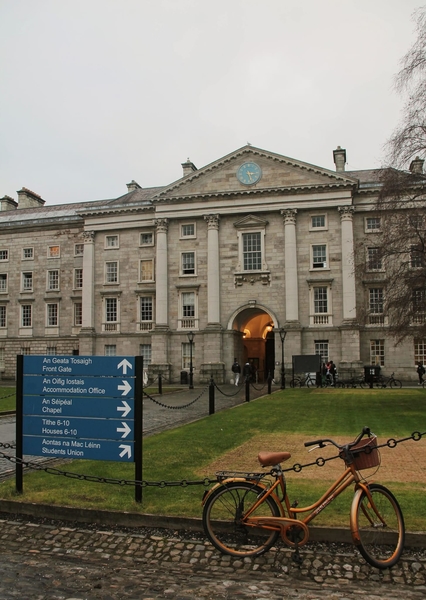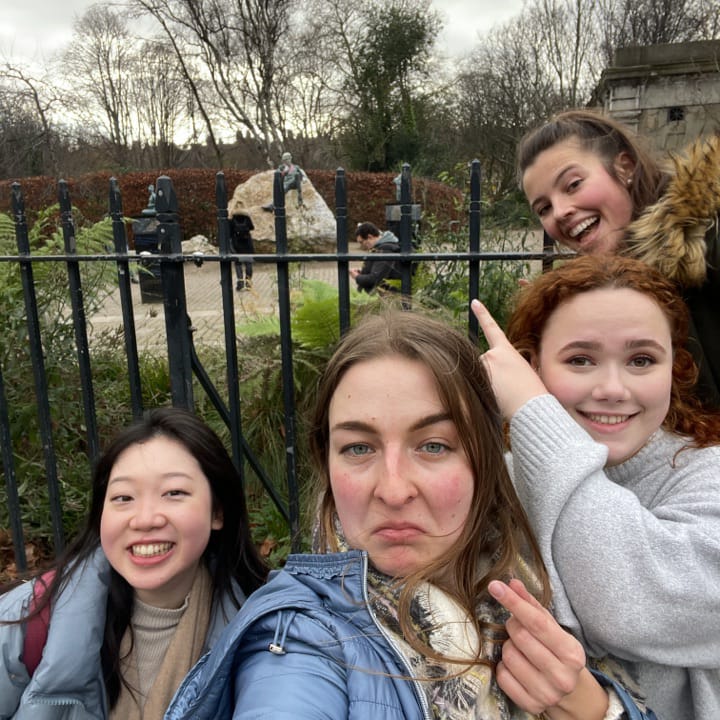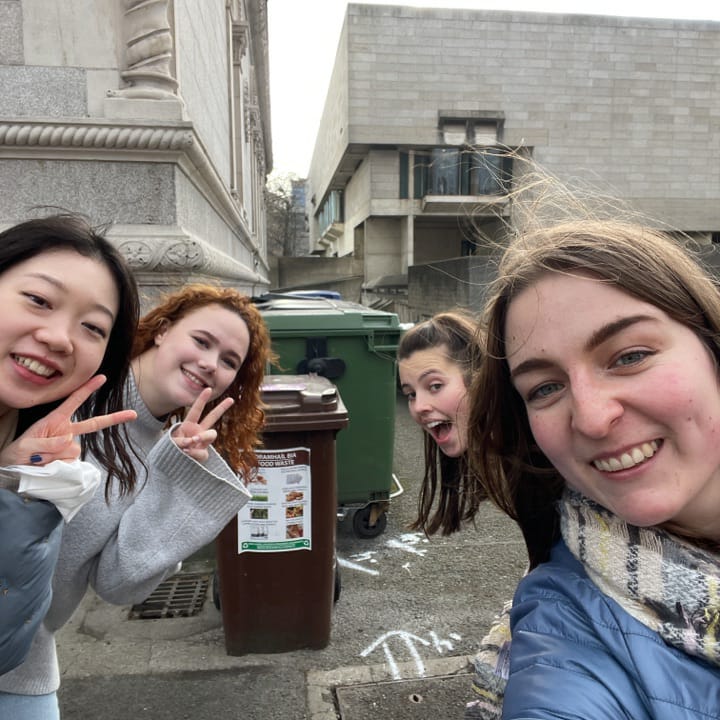
I have arrived in Dublin. Now, what is next?
In line with the series of posts about the application process of exchange studies that my college Ganna has presented, here I review the most essential things to take into account right after arriving in the country where your exchange will take place.
Although all the paper work and submissions that must be done in the beginning of an exchange period seem overwhelming, it only takes a little bit of patience and proper planning to easily hand in the needed documents and start enjoying your stay as soon as possible!
The biggest piece of advice for any exchange student is to attend the ”Orientation Week/Day” organised by your host universities. Usually, the Orientation is a wonderful time to mingle with other exchange students, as well as to get to know some locals. Similarly, it provides a great opportunity to learn about the country that you will be living in and their culture. Some universities may even arrange guided tours around the city. Finally, you might have the chance to ask questions concerning your studies, the host university, where to practise a hobby, etc. and obtain more personalised answers. With that been said, let’s have a look at the key matters to bear in mind during you first week of exchange!

Registration and module enrolment
Once your Learning Agreement (or Thesis Project) has been approved and you have received a Letter of Acceptance/Offer Letter from your host university, some institutions require students to register in their online portal. A month before the start of the Spring Semester 2022, the Academic Registry in Trinity College Dublin (TCD) sent an email inviting us to register via the website my.tcd.ie. This allows students to enroll in different modules and maintain an active student record at TCD (similar to being registered in the Swedish Ladok system). During the registration process, you will need to select to pay the fees (it is 0€ for exchange students, but you must accept this option anyways) and update your contact details.
If you are taking courses in the host university, the following step is to enrol in the modules you are interested in. The choice of modules is based on your Learning Agreement. To obtain advice on the courses (and other types of administrative support), you can always contact your Erasmus Coordinator at TCD (different depending on the department you will be studying at). The maximum amount of credits per semester is 30 ETCS, and at least 50% must be taken in the host department. My case is a bit particular, because I am here to work on my Master’s Thesis. Therefore, I did not have to enrol in any module. However, I had to sign up in the online portal to appear as a registered student at TCD. This is EXTREMELY important, because otherwise you will not be able to access any facility on campus, get your student card, etc.
Health and well-being
Regarding health and safety, Karolinska Institutet (KI) insures all their Erasmus Outgoing students via Kammarkollegiet. This covers the whole duration of the placement, including two weeks prior and after arrival in the country, and it is entirely free of charge. European Erasmus students also have a basic healthcare coverage through the European Health Insurance Card. Additionally, TCD has their own Health Centre for general and mental health. There is no charge for student consultations and COVID-19 testing. For some other tests a fee is applied, although this is generally more affordable than in private clinics.
During the COVID-19 pandemics, the TCD Health Service has operated several walk-in vaccination centres on campus. In the beginning of January, all students at TCD were encouraged to receive their vaccine (fist, second, or booster dose) completely for free. Myself, I decided I would get my booster dose in one of these walk-in clinics. The service was very quick and efficient. I was really happy to be given my booster shot. When it is your turn, say YES to the vaccine!

IT services
After registration, every student will obtain a unique login username and password to use the servives on the Trinity network (e.g., gain access to Trinity Wi-Fi, check your TCD email, access the Library online, etc.). A message with the subject ”Your Trinity Computer Account” will be sent to my.tcd.ie intray, which will enable your to set your own login credentials.
Similarly, all students at TCD receive a ”@tcd.ie” email address. The Trinity Student Email, aka MyZone, is the student email service at TCD to which all college communications are sent. It is importat to check it regularly to keep updated with the TCD news and events. Blackboard Learn is the Virtual Learning Environment at TCD. It is an online platform to download the lecture notes, assigments, and more module activities (equivalent to Canvas at KI). To get started with IT at TCD, check out the video at the IT Services website.
Cards
Student cards are probably the KEY for your student life in Dublin. Without them, you are simply not eligible for any benefit, discount, promotion, etc. that are often available for students. The first card you should apply for is your TCard (kind of similar to a Mecenat in Sweden, but not quite). It will not only be your student identification (you will be asked for it any time to prove that you are a student in Ireland), but it will also provide you the access to pay a variety of services across campus (and other related institutions within the city, e.g., St James’ Hospital). You can top it up online or at the loaders on campus. Believe me when I say that you will not be able to live without the TCard.
The second card that you might need is a Student Leap Card (SLC). This is a student transport card. It allows to benefit from student discuonts on public transport fares across Ireland (comparable to the SL Card in Stockholm). You can apply for a new student card online, and pick it up at your most convenient SLC agent (there is one located in the Trinity Students’ Union building). The cost of the card itself is 10€. You can top it up with as much money as you want (I will explain the exact use of it in a further post about ”Transport in Dublin”). No matter if you live within a five minute walk from college or 30 minutes away by bus, at some point of your stay you will inevitably take a mean of public transport in Ireland. For this purpose, your SLC will be your greatest ally.
Financing
When it comes to money, your home university (i.e., KI) will be in charge of paying your Erasmus+ Grant. There are two types of stipends depending on whether you will be studying or doing an internship/traineeship abroad. Before you fill in the application for the Erasmus+ Grant, it is crucial that you have signed and sent in a bunch of documents to your International Coordinator at KI, including the Letter of Acceptance/Offer Letter, Code of Conduct, and the certificate of the PREPARE course. Part of the grant (80%) is transferred at the start of the exchange period. The rest (20%) is transferred after the submission of the ”Certificate of Attendance” and approval of the Exchange Travel Report by KI. Please, be aware that your exchange is not over until you hand in all these papers!
Language
One of the requirements for obtaining eth Erasmus+ financial support is to carry out an Online Linguistic Support (OLS) language assessment before and after the mobility period. You will be taking an online test in the main language of instruction of your host country. The results of this test are not stated in your Transcript of Records, but are a way to improve your language skills. However, there are some exceptions to this. In my case, since English is the main language in Ireland and I am part of an English speaking programme at KI, I did not have to take the language test.
Even though Ireland is an English speaking country, Gaelic (i.e., Irish) is the other co-official language. In collaboration with Gaelchultúr, TCD offers free Irish language classes to all students. Classes take place online and on a weekly basis (50 minutes per class) for over 8 weeks. There are four different levels to choose (A1, A2, B1, B2). You can take an evaluation test to decide in which level to start. If you are not Irish and/or never lived in Ireland before, I would recommend going to the beginners’ level. I will be starting my Irish lessons the coming week, so I might be able to review the Gaelic language a bit better after some classes!
Student life
Finally, the BEST part of your exchange studies. TCD is a very lively university and things are happening ALL the time. They have 50 sports clubs and 120 socities in a range of disciplines and interests. Some sports clubs do compete in a highly professional level, but others have a more recreational purpose. You can read the information on the sports clubs’ websites and find out which suits you! Besides, there is also a Sports Centre on the main TCD campus. It contains a gym, a swimming pool, a climbing wall, several wellness studios, and various outdoor pitches and courts. Unfortunately, it is not free for visiting students, but fares are cheaper than other private sport facilities (75€/semester).
Regarding the societies, it is not necessary to be a member to participate in the events they organise. One of my favourite societies is the International Students’ Society (DUISS). They arrange day trips around Dublin, weekend trips in Ireland, social evenings, movie nights, etc. It is perfect to meet international or local people. Last weekend, they organised a Scavenger Hunt around campus. I was allocated to a random group, and I met three awesome girls that study at TCD. We did so well in the challenge that we even got a shared 4th place in the competition! As prize, we got tickets to one of the coming day trips to the Glendalough Lakes. It was an amazing experience!
Now, I am certain I probably overloaded you with all these facts. However, this is a guide to what I would have liked to know when I landed in Dublin. It is definitely not meant to stress you out, but to help. You will be given most of these bits of information during your Orientation Week, so do not panick. It is easier than it seems to get everything sorted out. To sum up, here I leave you an orientation checklist of what you need to do right before and after arriving in your exchange country. YOU CAN DO THIS!
- Log on to my.tcd.ie and register yourself in the online portal.
- Enrol in the modules agreed on your Learning Agreement (only applicable if you are taking courses).
- Make sure you have the Kammarkollegiet insurance and EHIC.
- If possible and needed, get your COVID-19 vaccination!
- Set up your login username and password for the Trinity IT Services (MyZone email, Blackboard Learn, Wi-Fi, etc.).
- Apply for and collect the TCard and the Student Leap Card.
- Send required documents to receive your Erasmus+ stipend. Do not forget the ”Certificate of Attendance” at the end of your exchange.
- Take the OLS language assessment test (if needed).
- Actively integrate in the student life of your host university by joining sports clubs, societies, student unions, language courses, etc.
- But above all, ENJOY!





0 kommentarer